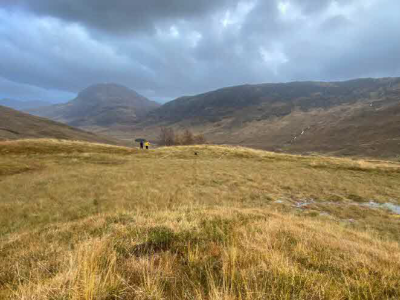Tuesday 21st November 2023, 10:04am

Mountaineering Scotland, as part of a coalition of community, conservation and outdoor recreation groups, has written to the UK Government asking it to review its rollout of the Shared Rural Network programme to prevent causing unnecessary damage to communities and wild places.
Applications for telecom masts are flooding into Local Planning Authorities across Scotland with little justification as to their specific siting and design. Many of the applications lack meaningful knowledge of the sites they are proposed on with blatant disregard for whether communities will actually benefit.
The rushed approach is being driven by a geographical target, set by the UK Government, to bring 4G mobile network coverage to 95% of the UK by end of 2025. The coalition supports digital connectivity for homes and businesses throughout the UK, but the present programme’s geographical target means it is not targeting homes, businesses and rural road networks, where connectivity is needed. The actual benefits are therefore unclear, given some rural communities say they don’t want these masts, whilst in the wild and sparsely populated mountain and upland landscapes, which are expected to host new mast and tracks, there are no communities to benefit.
In June 2023 the coalition published a statement of concern and in July 2023 Mountaineering Scotland, the John Muir Trust and the Knoydart Foundation met with representatives of the Shared Rural Network programme and the mobile network operators to discuss the concerns. Subsequent attempts to re-engage have failed so the coalition decided to write to Ofcom Scotland and has now written to the UK Government’s Minister for Data and Digital Infrastructure.
In their letter to the Minister, the Coalition points out that the current approach is an under-utilisation of infrastructure and waste of significant public funds. In writing to Ofcom Scotland, the Coalition asked the programme to prioritise mast applications where the mast signal would provide coverage and associated connectivity benefits for rural residents’ homes and business premises, and gaps along the road network. This approach would save public money and Planning Authorities resources and would respect the wishes of rural communities, such as the Knoydart community, where there is unanimous opposition to new telecom masts proposed on the peninsula.
Planning Authorities in Scotland are currently dealing with an onslaught of telecoms mast applications and assessing them against relevant planning policy. The Highland Council recently refused an application for a mast in Glen Orrin, near Strathconon, on the grounds it would have significant impacts on wild land and for failing to include any measures for biodiversity enhancement, nor an assessment of potential damage to existing biodiversity.
In the past two weeks the John Muir Trust has discussed the programme and our concerns about the approach with Drew Hendry, MP for Inverness, Nairn, Badenoch and Strathspey, and Ian Blackford, MP for Ross, Skye and Lochaber.
We are asking anyone who shares our concerns to write to the UK Government’s Minister for Data and Digital Infrastructure to raise your concerns.
Davie Black, Access and Conservation Officer for Mountaineering Scotland said: “We absolutely support the principle behind the programme. Local residents and businesses have the right to digital connectivity. But it is communities themselves who are speaking up, saying the siting of the masts will not benefit them. The plan must be paused so we can all sit around the table and get this right. We want to ensure digital connectivity is achieved while protecting Scotland’s last wild landscapes.”
Mike Daniels, Head of Policy at the John Muir Trust said: “We want 100% digital connectivity for people and communities in rural Scotland, rather than 95% coverage on a map. That is why we are asking the UK Government, Ofcom and the operators to prioritise proposals where the mast signal would provide coverage and associated connectivity benefits for rural residents’ homes and business premises, and gaps along the road network.”
The Knoydart Foundation strongly opposes any new telecoms mast on the Knoydart peninsula, stating: “The Knoydart Foundation, as a representative of the community on Knoydart, respects the outcome of a recent community consultation on proposals to erect further telecoms masts across the Knoydart Peninsula. The Knoydart Foundation will not support or facilitate in any way future development of these proposals. On community owned land we are actively opposing such works as have been proposed.”
Image (top right): An example of inappropriate 4G mast proposal location, near Loch Mullardoch/Credit: WHP Telecoms